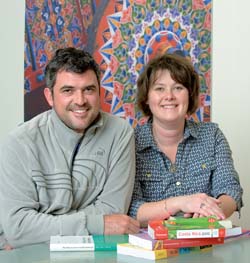 |
 |
| current issue |  | past issues |  | send a letter/news |  | address update |  | advertise |  | about us |  | alumni home |
Features
|
Investing in People, Not Guns
|
Return to Don't Cast Off Without a Paddle |
Can an army of teachers replace an army of soldiers? UNH student Keper Connell '12 thinks so.
A Spanish and international affairs major, Connell '12 grew interested in the concept of a country without soldiers during his Politics of Cost Rica class. Following a brief but horrific civil war, the Latin American country abolished its military in 1949. During the decades that followed, Costa Rica chose to invest its money on education and health care instead of bullets and guns.
"Having no military makes this country so different than every other country in Latin America," explained Connell's teacher, Assistant Political Science professor Mary Malone. "I thought it would be great to introduce students to a country that defied the odds."
 Keper Connell ’12, Spanish and international affairs major, left, with Mary Malone, assistant professor, political science |
As part of their research, Connell and eight classmates traveled with Malone to Costa Rica in January. During their three week-long trip, they toured research centers, congressional offices, banana and coffee bean plantations. Each student also lived with two different Costa Rican families during part of their stay.
"The students saw a part of Costa Rica that you don't see as a tourist," Malone said. "They got to live daily life as Costa Ricans do and ask their host families question about what they have learned in classroom."
Though Connell had visited Costa Rica twice before on vacations, he spent most of his time on the coast in the country's tourist regions. His trip with Malone and his fellow students took him into Costa Rica's rural interior to communities that are rarely visited by foreigners.
Connell spent two nights in a region surrounded by rain forests, coconut trees, and exotic wildlife. He toured coffee bean plantations and learned how to plant and harvest chocolate bushes. He also talked to his host families, both in rural Costa Rica and the capital city of San Jose, about the progress their country has made eliminating the military and spending more on health care, education, the environment and ecotourism.
"I lived with a family where the father had worked 30 years at water facility, which has been a success," said Connell, who lives in Rye, New Hampshire. "Most of Costa Rica has drinkable water in region where that is oxymoron. The people take great pride in their country and believe in the system."
The conversations Connell shared with his host families and other Costa Ricans confirmed his thesis: It is possible to replace an army of soldiers with an army of teachers.
"When Costa Rica abolished its military in 1949 they took all of that money that is normally spent on defense and channeled to investing in human capital," Connell said. "So they have a really strong health care system with fundamental prevention programs from infancy on."
Sandwiched in between Panama and Nicaragua, Costa Rica, Connell learned, also boasts a 96 percent literacy rate—the highest in Central America. Costa Rica is one of the few Latin American countries where a large percent of students pursue higher education. Students who do well and cannot afford college can attend at no cost and sometimes receive money to cover books and living expenses. Other students pay low administrative fees to enroll.
Though Costa Rica is about the size of West Virginia, with a population of 4.6 million compared to the United State's 300 million, Connell still believes the country has important lessons and successes to share. In his research, Connell noted that the United States military budget totaled more than $623 billion in 2008, while Costa Rica spent nothing.
"In the United States, we spend enormous amounts of money on defense and it seems like when it comes to education, teachers have to fight for every penny," Connell said. "Using Costa Rica as an example, there should be movement for us to spend less on our military and more on our health care and educational systems."
Like most of the students who traveled to Costa Rica, Connell's passion for his research was fueled by his visit and discussions with the people who live in the country known for its high quality of life.
"Traveling to Costa Rica and living with its families allowed the students to put what we learn in the classroom in a concrete context," Malone said. "This kind of trip opens up all kinds of international experiences. And for many students, this is beginning step in exploring the world around them."
—Barbara Walsh '81
blog comments powered by Disqus

